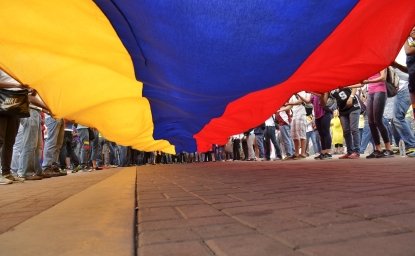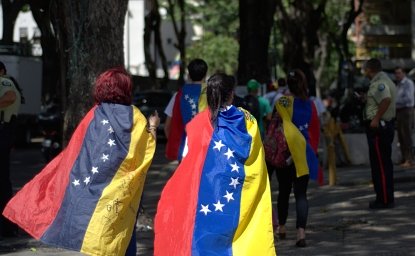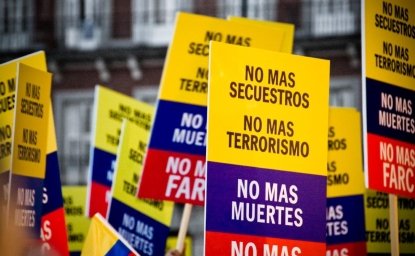A major crisis stands in the way of the Obama administration Latin America foreign policy team leaving office with complete peace of mind: Venezuela’s great collapse and its potential for a man-made humanitarian disaster and regional political instability.
In 2015 Venezuela entered another downward spiral. This began when the oil market crash exposed the weaknesses of an economic model highly dependent on a constant flow of petroleum revenues, and characterized by mismanagement and widespread corruption. The descent has been marked by the Maduro government’s authoritarian turn, an escalation of already high political tensions, frighteningly high levels of organized crime, and hundreds of mini social explosions over the lack of food and other basic goods.
In August U.N. Secretary General Ban-Ki Moon described the country’s chronic shortages as “creating a humanitarian crisis,” a situation which is most evident in the nation’s collapsing health sector. Additionally, in a fairly direct reference to the importance of electoral processes, Secretary General Ban-Ki Moon called on President Maduro to “listen to the people… as soon as possible.”
Maduro has proved to be anything but a listener. In October the government’s use of the courts as a judicial shield against both legislation and the popular will have reached new heights. On October 12 Maduro bypassed the National Assembly to have the Supreme Court pass his National Budget, the first time in 150 years Congress did not have a role. On October 20, government supporters orchestrated a judicial coup against the recall referendum by pushing complaints of fraud committed during an earlier round of the recall process through state-level courts. This prompted the electoral tribunal to call off the twenty percent signature collection process previously set to commence October 26. These wanton abuses of power triggered high stakes responses: the opposition decided to hold special sessions of Congress, in which opposition parties have begun a “political trial” examining Maduro’s responsibility in the breaking of the Constitutional order, and to organize an escalation of direct action protests including the October 26 “Taking of Venezuela” protest, which generated significant turnout and entailed a heavy dose of repression; an October 28 twelve-hour-long National Work Stoppage; and, barring a reversal by the electoral tribunal regarding the recall referendum, a November 3 march on downtown Caracas, which could turn toward the Miraflores Presidential Palace.
In the meantime, international mediation efforts took a step forward with the formal inclusion of an emissary from the Vatican. The opposition Mesa de Unidad coalition first solicited the Vatican’s involvement in any future dialogue in July. The Vatican formally agreed to play a role in talks in September, and the government and the opposition formalized their acceptance of a multiparty dialogue framework with the Vatican alongside UNASUR representatives José Luis Zapatero, Martín Torrijos, and Leonel Fernández during the last week of September.
The status of the dialogue is difficult to characterize. Mediators are in place but there is no agreed schedule. An announcement of a first round of talks generated much criticism from a range of influential opposition sectors that argue the government has yet to show its commitment to the process. The opposition is constantly hamstrung by coalitional politics. It is attempting to find the right formula to meet the challenge of working on both fronts—to pressure the government in the street and pursue talks with third party assistance.
State Fragility and the Risk of Breakdown
Beneath the country’s surface level political crisis lie deep weaknesses and widespread discontent. Institutional capacity is so low that Venezuela has fallen into a condition of high state fragility. Venezuela has the world’s lowest rating in the World Justice Project’s Rule of Law Index, and, according to the latest IMF outlook, real GDP could decline by double digits this year and the sky high rate of inflation could accelerate into hyperinflation.
The Maduro government’s main strategy is to buy time while pressing hard for coordinated action among oil producing nations. Its hope is that oil prices continue to climb above $50 a barrel, granting the government some breathing room. Nevertheless, even if price strengthening efforts bear fruit, they will not change the fundamentals on the ground. The state oil company’s production capacity is down 200,000 barrels a day (2.5 million to 2.3 million), the government seems unwilling to lift its draconian controls over the economy, and persistent shortages make the risk of a nationwide social explosion high in 2017.
It is evident to national political leaders that they are walking in a minefield. If they take the wrong steps, they could unleash an even bigger tragedy than the one currently playing out.
It is a very bleak picture, and it is evident to national political leaders that they are walking in a minefield. If they take the wrong steps, then they could unleash an even bigger tragedy than the one currently playing out. Worse yet, leaders may not be able to control the situation. Discontent seethes beneath the surface, and with the recall referendum shut down, there is no electoral channel for channeling this discontent.
With the situation poised between crisis and collapse, Venezuela needs help avoiding a complete breakdown as well as international assistance to reestablish institutional capacity and develop democratic governance solutions for defending and protecting the population. Faced with this dual challenge, U.S. policy is performing a balancing act: promoting stability and promoting democracy.
U.S. Interests and Policy Efforts
First, the Maduro government’s authoritarian turn poses a threat to hemisphere-wide gains at consolidating democracy and strengthening human rights. The Secretary General of the Organization of American States, Luis Almagro, has made this case publically and in writing, calling for fair elections and for a recall referendum on Maduro’s rule to be held in 2016.
Two, the economic crisis has turned social unrest into a stability problem which is already producing repercussions in Venezuela and beyond. The country’s great recession has pushed middle income sectors into poverty and produced disturbingly high levels of social instability. Though some recent data on social instability indicates the number of lootings is down from the high of 162 in June to 44 in September 2016, thanks to the combination of unrest and political discontent, Venezuela remains a powder keg. With chronic food shortages sending people to bed hungry, high levels of criminal violence growing into a low intensity conflict involving criminal bands, paramilitary groups, and state security forces, and outright anger with the Maduro administration intensifying after the shutdown of the recall referendum, it is unclear how the pressure can be peacefully relieved.
The country’s great recession has pushed middle income sectors into poverty and produced disturbingly high levels of social instability.
If the situation explodes into civil strife, then Colombia, which shares a 1400-mile-long border with Venezuela, and the Caribbean, where energy dependent nations would be left without supplies of oil from Venezuela, are the most vulnerable to instability. On Brazil’s northern border with Venezuela, the state of Roraima has received an estimated 30,000 Venezuelans since the start of 2016. Venezuelan asylum requests here in the United States have jumped 168% in 2016.
Third, Venezuela has become a major transit route for narcotraffickers. During the crisis, rife lawlessness and instability have provided favorable conditions for organized crime networks to establish strong roots in the country, adding a dangerous new layer to the citizen security crisis, which already resulted in Venezuela having one of the highest murder rates in the world. There are increasing questions about the extent to which narcotrafficking has penetrated the state.
The United States has responded to these threats by 1) highlighting its defense of democracy, both through U.S. bilateral efforts and via support for Almagro’s enactment of the Inter-American democratic charter; 2) calling for dialogue as a conflict prevention mechanism; and 3) speaking out about the importance of fighting transnational crime. But the Venezuela crisis needs more than vigilance. It needs forward-looking action. A proactive U.S. policy is needed to help improve conditions so that a peaceful, democratic resolution can be found.
Marshalling Multilateral Crisis Management
The emergent humanitarian crisis demands a plan for international cooperation to help Venezuela avoid disaster and get on a path toward reconstruction. But—with the Maduro government rejecting the diagnosis that it is experiencing such an extreme crisis and showing no willingness to accept aid—such a plan may have to wait until the political crisis between the government and the opposition is resolved. Thus, first there needs to be a proactive U.S. diplomatic strategy. This should center on marshalling multilateral consensus around a crisis management strategy and a unified action plan.
What are those U.S. diplomatic efforts? This year they have entailed striking a balance between calling for dialogue and vocally supporting the recall referendum. In July 2016 President Obama voiced support for both a substantive dialogue between the government and the opposition and for the recall referendum, importantly, in that order. Two months later Vice-President Joe Biden switched the order of these priorities in a major foreign policy address to Western Hemisphere regional leaders gathered in Washington. Weeks later Secretary of State John Kerry held an unannounced meeting with President Nicolás Maduro at the September 26 peace accord signing ceremony in Cartagena, Colombia, after which the State Department announced that Kerry had expressed concerns about the humanitarian effects of the crisis, “support for democratic solutions reached through dialogue and compromise,” and a willingness to continue recently restarted bilateral diplomacy.
Together, the two speeches and the meeting in Colombia show the administration is trying to lend support to both dialogue and electoral initiatives. Until now the dialogue process has been led by former Spanish Prime Minister José Luis Zapatero, and his efforts take place under the auspices of the UNASUR Secretary General, Ernesto Samper, whose term concludes at the end of 2016. Zapatero’s mediation efforts have yielded exploratory talks and the release of some individual political prisoners. But there has not been a net change in the number of prisoners, a real change in the government’s posture about dissent, or improvement in human rights. The recent inclusion of the Vatican reenergized the dialogue process and pleased many international stakeholders, but it is on hold after the government’s authoritarian treatment of the opposition pushed the conflict back into the street.
For the United States, the balancing act of lending support to both the dialogue and recall processes yielded multilateral dividends, as evidenced by a strong August 11 joint statement signed by fifteen countries and a new October 22 joint statement after the suspension of the recall process. This is beneficial since the United States is more likely to effectively influence Venezuela if its efforts have multilateral support. Ultimately, though, gaining influence requires a more direct form of addressing the crisis than we have seen so far. This part is easier said than done.
Though there is now more widely shared agreement that Venezuela has moved far off the democratic path, obtaining consensus about action for effective crisis management does not directly follow. For example, the European Union and Britain are much more reticent about calling the government to task and backing up such statements with the possibility of smart sanctions. They seem to prefer dialogue for the sake of lowering tensions.
While the Maduro government’s international support has declined dramatically, it still has strong ties with both Russia and China, as well as an emerging relationship with India, a crucial new market for oil exports and commercial imports. With Cuba, Venezuela has an ideological kinship and a strategic relationship based on exchanging oil for intelligence, technical, and social assistance.
Cuba’s bilateral normalization talks with the United States operate on a separate track. Havana is strongly in favor of government stability in Caracas. Regionally, Cuba’s goals are to strengthen the ALBA alliance of Bolivia, Cuba, Ecuador, Nicaragua, and Venezuela, as well as regional bodies that do not include the United States, such as UNASUR and CELAC. Therefore, we should not expect Cuba to join multilateral efforts to press for dialogue in Venezuela. Instead, the United States should keep open the possibility for back channel diplomacy to Caracas via Havana, as Secretary Kerry’s remarks alongside Cuban Foreign Minister Bruno Rodríguez have implied before.
Costs and Benefits of Direct U.S. Action
It needs to be underscored that while multilateral coalition building is a top U.S. priority, this does not mean Washington is forgoing the option of direct action. The Obama administration extended Executive Authority to sanction Maduro government officials for human rights abuses or corruption. It may impose more targeted sanctions if the blocking of a recall referendum ends up triggering a cycle of protest and repression. Such a move would be consistent with precedent. For example, after reaching the determination that the costs of inaction outweighed the costs of action, the U.S. sanctioned seven officials for their connections to repression of the 2014 “La Salida” protests.
This time there may be a different international reaction. In the current political landscape, costs to the United States for imposing sanctions may be lowered. With South America making a center-right shift, most notably in Argentina, Brazil, and Peru, and these governments taking increasingly public stances about rights abuses in Venezuela, the Maduro government could face obstacles to counter-mobilizing a condemnation of U.S. sanctions.
We lack a clear picture of what effect the sanctions have had on the Maduro government’s stability—either positive or negative. However, we do know from polling that the sanctions did not backfire in terms of unintentionally giving the government an extended popularity boost. Despite Maduro’s nationalistic ploy to rally around the flag in the wake of the March 2015 sanctions, his approval rating increased three points (25% to 28%) before regressing to the previous level and then dropping to its current range between 20–25%. Moreover, after being sanctioned, the Maduro administration has still been willing to hold diplomatic talks with top U.S. officials. In fact, government officials have seemed eager for photo-ops with U.S. officials, playing up the significance of these meetings as if they amounted to signs of full mutual respect between the two nations.
This suggests something very important about the balance of power. If, for example, the United States cannot marshal multilateral support for a more robust form of crisis management by international players, then there is a good chance it can still carry out strong unilateral actions without undermining future diplomatic engagements with Caracas.
Though the United States should not base its decisions on public opinion, overreaching presents its own set of risks.
Though the United States should not base its decisions on public opinion, overreaching presents its own set of risks. Another round of smart sanctions is unlikely to permanently alienate regional and European partners. However, if the United States decided to change the scope of the sanctions, by either explicitly targeting officials for state corruption or ordering more punitive actions at state oil company P.D.V.S.A., such stronger action could damage multilateral efforts.
Through the U.S. judicial system, there already exist investigations into corruption in the oil sector, including Venezuelans connected to the industry but who reside in the United States, as well as a high profile narcotrafficking case against the President’s nephews. With judicial processes already placing pressure on those connected to the ruling coalition, it may be best to hold off on additional action on these topics while court processes play out. Venezuela is already paying a high cost for its tarnished reputation in financial markets where creditors charge a high fee for lending. Moreover, on principle, South American governments may not like the idea of the United States leveraging corruption for foreign policy goals.
Into 2017: A New Year of Challenges
The Venezuela crisis presents the United States with a problem that global powers often face. While the United States is not responsible for the crisis, in the final analysis Washington will be judged based on its leadership of crisis management efforts.
In the remaining months of 2016 the Obama administration should continue to make clear its full support for electoral solutions and the need to liberate political prisoners, and frame these as necessary ingredients to the Vatican helping establish a genuine dialogue.
But the Venezuela crisis needs more than vigilance. It needs forward-looking action.
It should also evaluate the possibility of making the Venezuela crisis a top agenda item at next month’s November Asia-Pacific Economic Cooperation Leaders’ meeting in Lima—President Obama’s last high-level regional forum, which is also scheduled to be attended by the Chinese and Russian heads of state.
More than likely, the crisis will roll on. The next U.S. administration will face the choice of continuing the existing efforts, redoubling them or moving in a different direction altogether. In any case, the task requires placing pressure on Venezuela both bilaterally and multilaterally.
Policies should be in line with capacities. Crisis management is very difficult in Venezuela. Beyond the fact that the instruments of diplomacy are highly imperfect, the United States does not have many good levers, and the Maduro government has shown no willingness to accept outside help.
Muddling through will simply prolong the agony of Venezuelans hard hit by the country’s economic, political, and security crisis. While it is not time for the United States to make rash decisions, a real sense of urgency exists about the country’s current state and near-term future. Time is running out to help. It is essential that the Obama administration take decisive action and not allow the crisis to pass to the next administration without a clear roadmap.






